Being someone engaged in academic work, I've experienced firsthand just how rapidly the research world is evolving. With thousands of new studies emerging daily, I found it nearly impossible to stay updated without the right tools to support my workflow. Therefore, I started searching for the best AI for academic research to manage information while focusing on insights that truly matter for my work.
In this article, I'll compare the top AI tools available and highlight why UPDF AI Online stands out for academic workflows. Unlike generic AI assistants, UPDF AI Online is built for structured academic tasks like searching papers, summarizing studies, and extracting insights, making it an all-in-one solution for serious research. For now, I'll highlight some reasons why students and researchers need these tools.
- Faster Literature Search: Locates and filters relevant academic papers to save hours of manually scanning journals and online databases.
- Deep Analysis Support: Breaks down complex methodologies and findings into understandable insights for more effective research comprehension.
- Summarization: Converts lengthy academic PDFs into structured summaries for better understanding of core ideas and arguments.
- Citations: Generates and extracts references from sources to minimize errors and maintain proper formatting for research papers.
- Time-Saving Workflow Integration: Reduce repetitive work and improve research productivity by combining searching and citation tasks in one platform.
Part 1. What Makes an AI Tool Good For Academic Research?
Before I explore the best AI tools for academic research, let's outline the unique features you should keep in mind before choosing one.
1. Literature Review: Automates paper searches and extracts summaries from large-scale academic databases for deep context.
2. Citation Tracking: Tracks how research is cited, shows supporting or contrasting evidence for each key study.
3. Research Discovery: Finds related studies and maps connections using visual citation graphs and author networks.
4. Systematic Screening: Accelerates review phases by prioritizing studies and enabling efficient conflict resolution for teams.
5. Visual Mapping: Builds interactive graphs to reveal relationships between authors, fields, and academic trends.
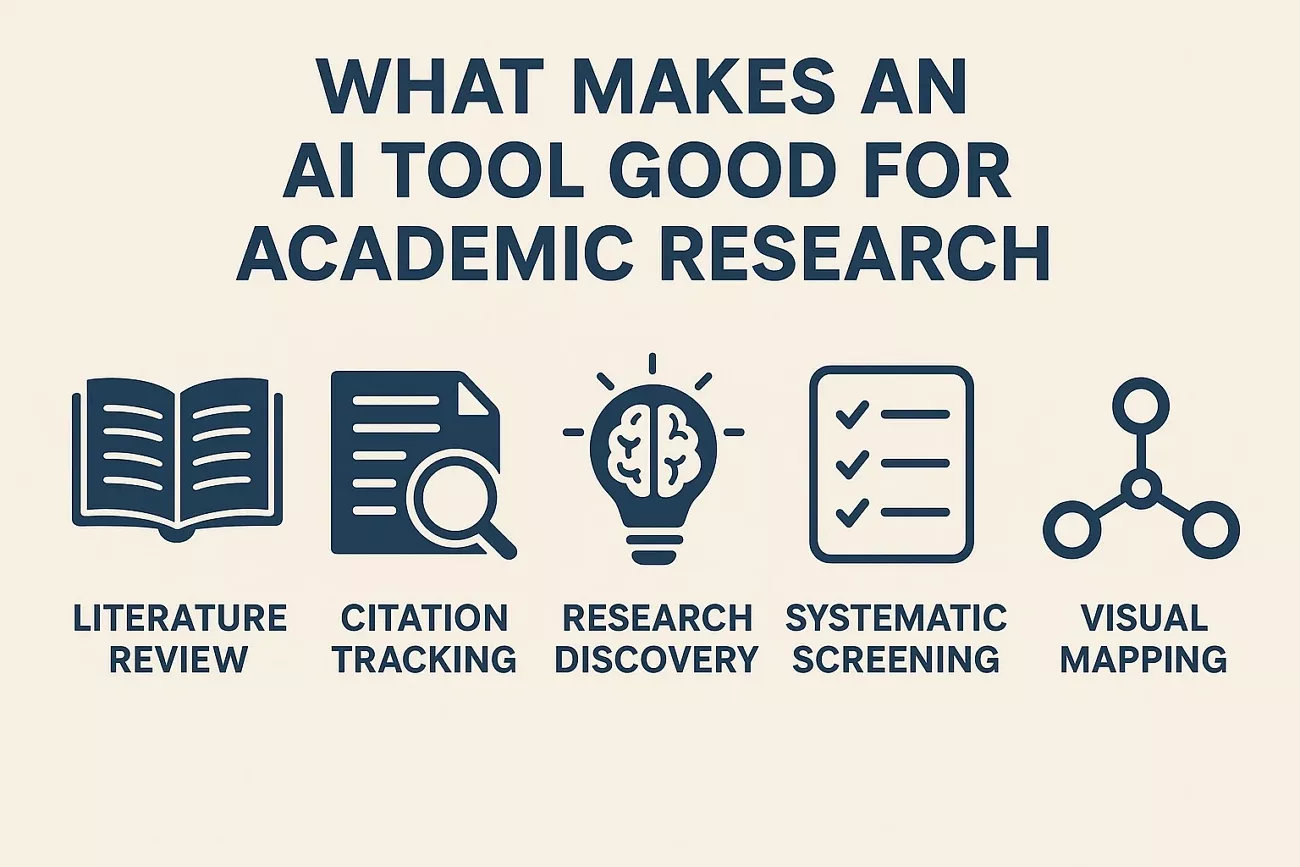
Part 2. The Best All-in-One AI for Academic Research: UPDF AI Online
When it comes to academic research, finding a single AI tool that combines searching and analyzing papers was challenging for me. This is where UPDF AI Online came in, offering an all-in-one platform designed specifically for students and researchers. It helps users extract insights quickly, manage documents, and focus on meaningful analysis.
Introduction to UPDF AI Online:
Why UPDF AI Online Stands Out?
To find the answer to what is the best AI tool for academic research, I tried many tools and found UPDF AI Online as the best option. Let me share reasons why I found UPDF AI Online better than other options.
- AI Literature Summarization: Generates concise paper summaries, section overviews, and structured insights to speed up literature review.
- Citation & Reference Extraction: Automatically extracts references, citation formats, and key sources from PDFs for quick academic use.
- One-Click Paper Library Management: Allows you to save uploaded papers into your personal library, making it easier to organize reading materials.
- Structured Academic Analysis: Provides outlines, research questions, methodology summaries, and key findings to support deeper understanding.
- Side-by-Side Translation for Papers: Translates academic PDFs with aligned highlight mapping for easier bilingual reading.
- Other Features: It also provides many other useful features, like converting PDFs to mind maps, converting PDFs to Word/Excel/PPT, and chatting with images.
Feature Highlight: Scholar Research
This feature works by having you enter a keyword, then instantly presenting a tailored set of questions so you can clarify your topic and customize your research approach. After you answer, the best AI for academic research searches trusted academic sources and gathers relevant papers and key insights. Both Standard and High Quality modes are available for flexible searches.
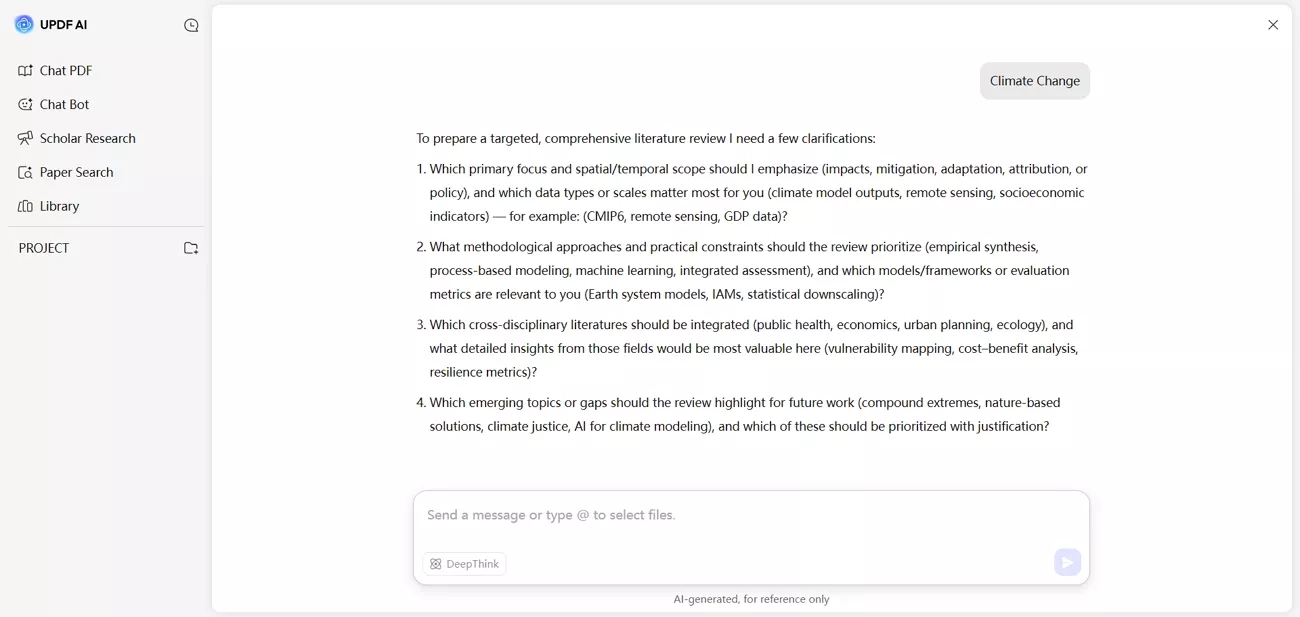
Key Characteristics
1. Academic search applies smart filters to refine and personalize each research result.
2. Automatically generates literature overviews complete with well-structured synthesis and key points.
3. Tracks sources and citations with every output to guarantee research accuracy and transparency.
4. Offers a fully integrated, ad-free workflow for faster completion of in-depth academic assignments.
Feature Highlight: Paper Search
It finds academic papers by letting you enter keywords or topics and instantly delivering a curated list of relevant studies. This locates key papers, provides overviews, structured summaries, and actionable insights within seconds. Its built-in filters help you sort by publication date, field, or document type for precise research.
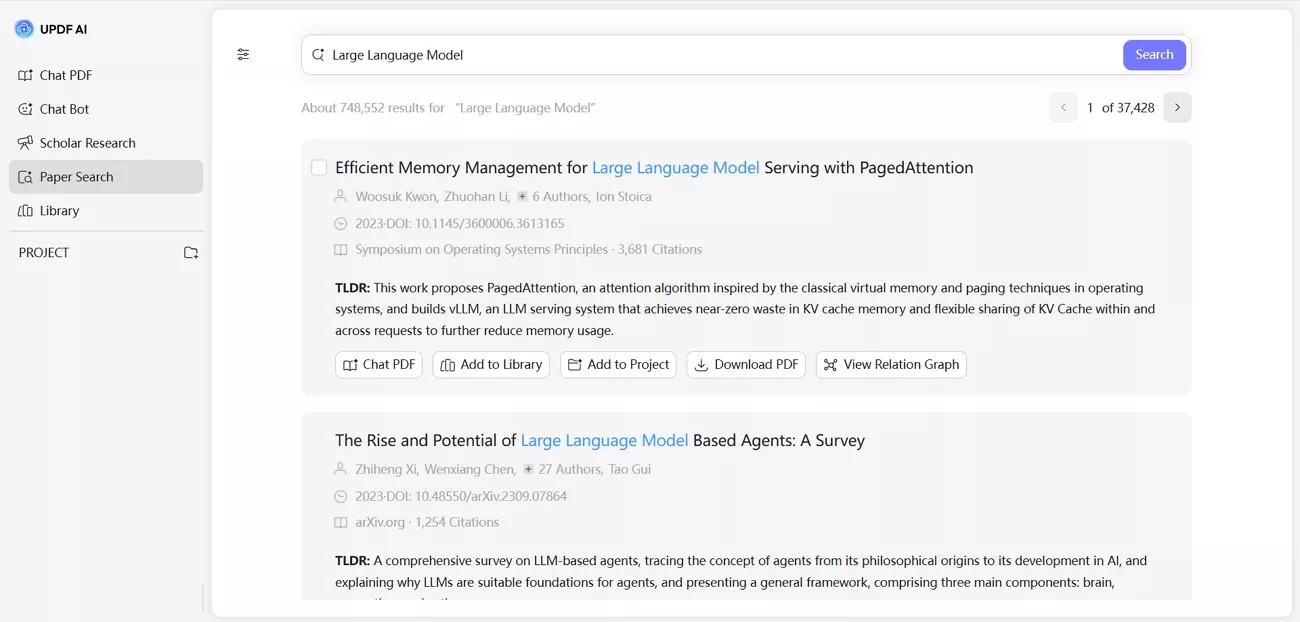
Key Characteristics
1. Use dynamic filters to sort by year, study field, or availability of downloadable PDFs for targeted searches.
2. Generates AI-powered summaries, saves papers to your library or projects, and bulk-manages selected results.
3. Explore visual Relation Graphs showing how papers connect through citations and discover referenced or citing works.
4. Translate paper summaries into your preferred language and dive deeper into citations and reference tracking.
How to Use UPDF AI Online for Academic Research
Having introduced the most helpful features of one of the best AI tools for academic research, follow the steps below to see how you can utilize it:
Step 1. Access Scholar Research Feature
Once you open the main interface, click on the "Scholar Research" option on the left menu and enter the research topic in the designated box. Next, choose the "High Quality" mode and press the "Send" button.
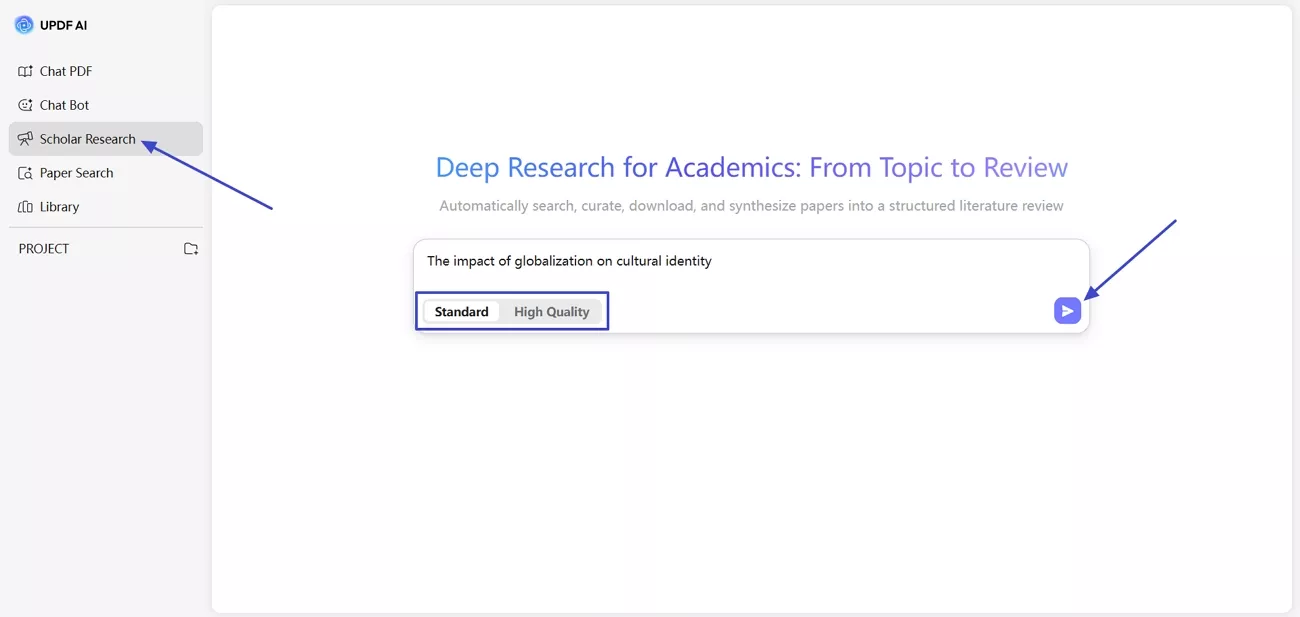
Step 2. Answer Auto-Generated Questions
The platform will ask you some questions that you need to answer. Type the answers of the questions and let UPDF AI Online start the research process.
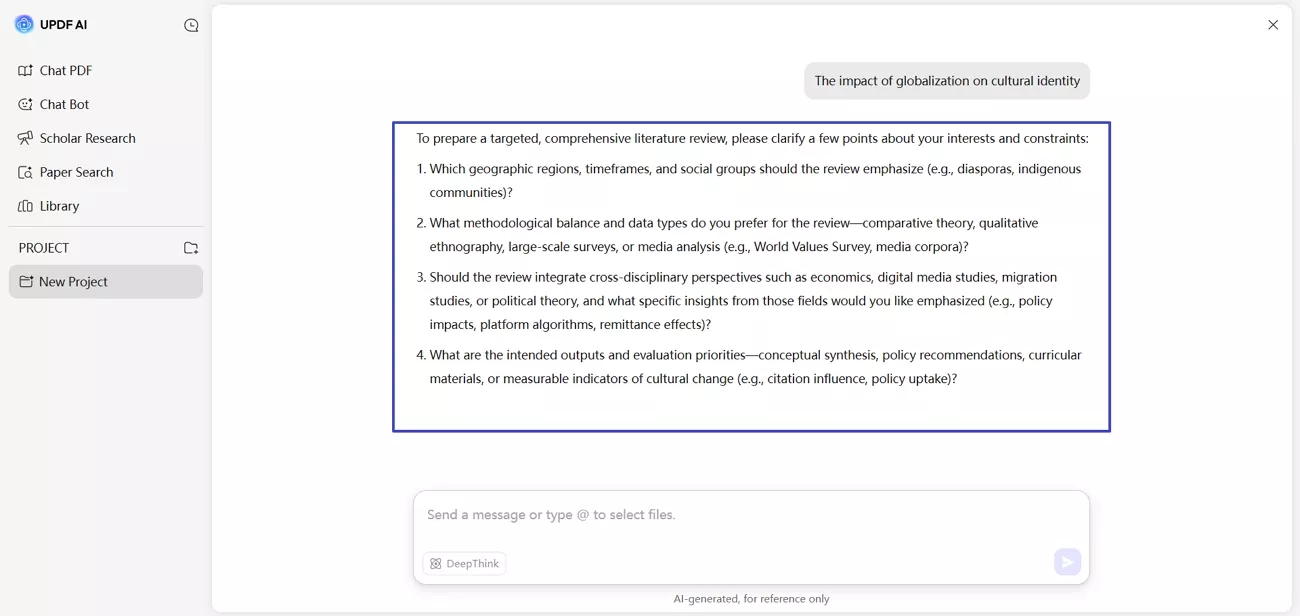
Step 3. Download Researched PDF Document
After the chat provides the PDF file, click on the file to view it in the "Note" window. Next, click on the "Download" button to download the PDF document. Also, access the extracted finding in the left menu.
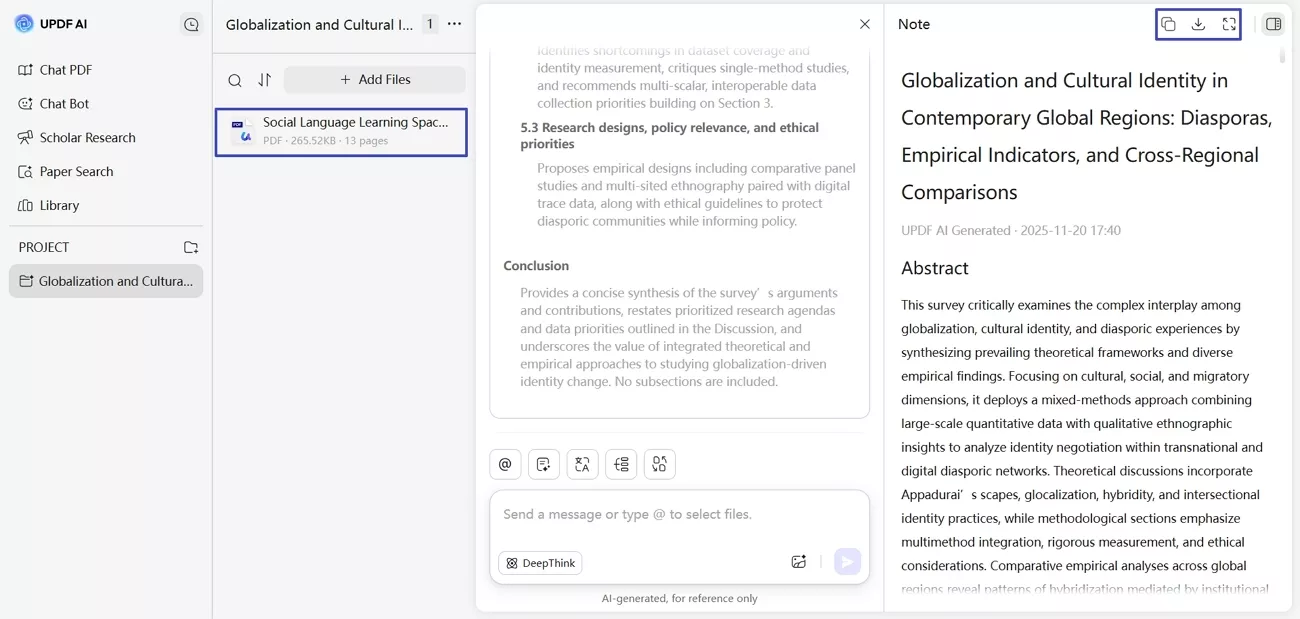
Step 4. Use Paper Search Tool
Next, click on the "Paper Search" option and enter your keyword to scan multiple academic sources and collect the most relevant papers for your topic automatically.
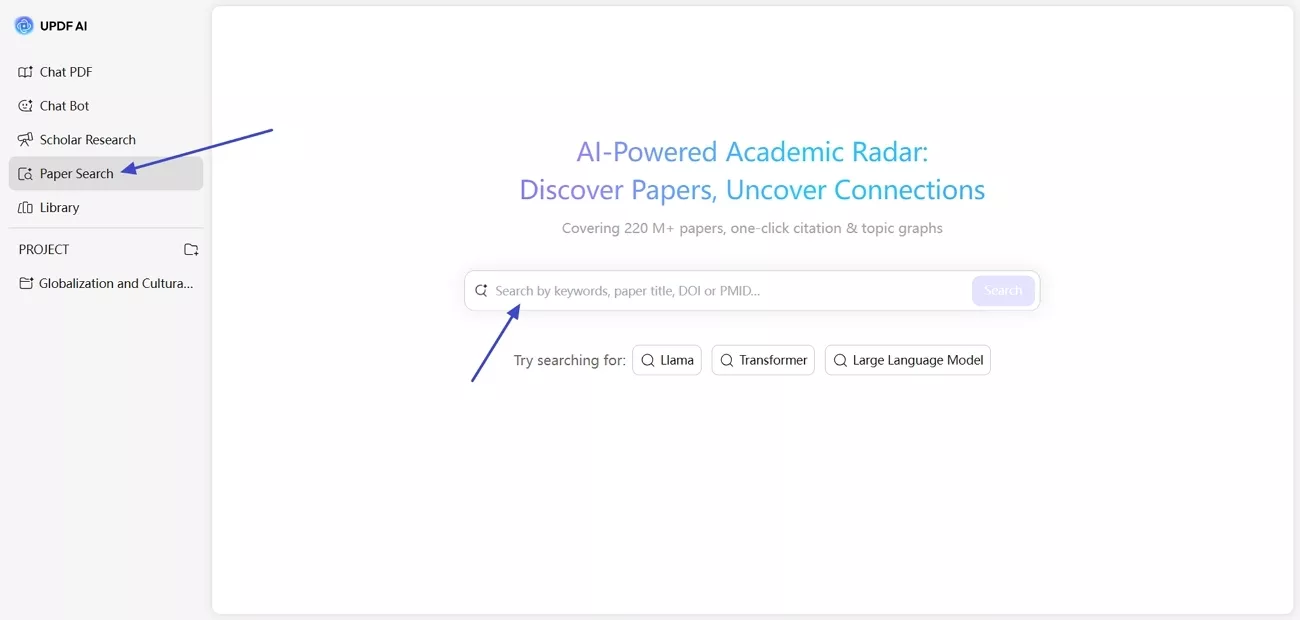
Step 5. Chat With or Download PDF
Lastly, press the "Chat PDF" option if you want to ask further questions regarding the topic or hit the "Download PDF" button to get the generated PDF document.
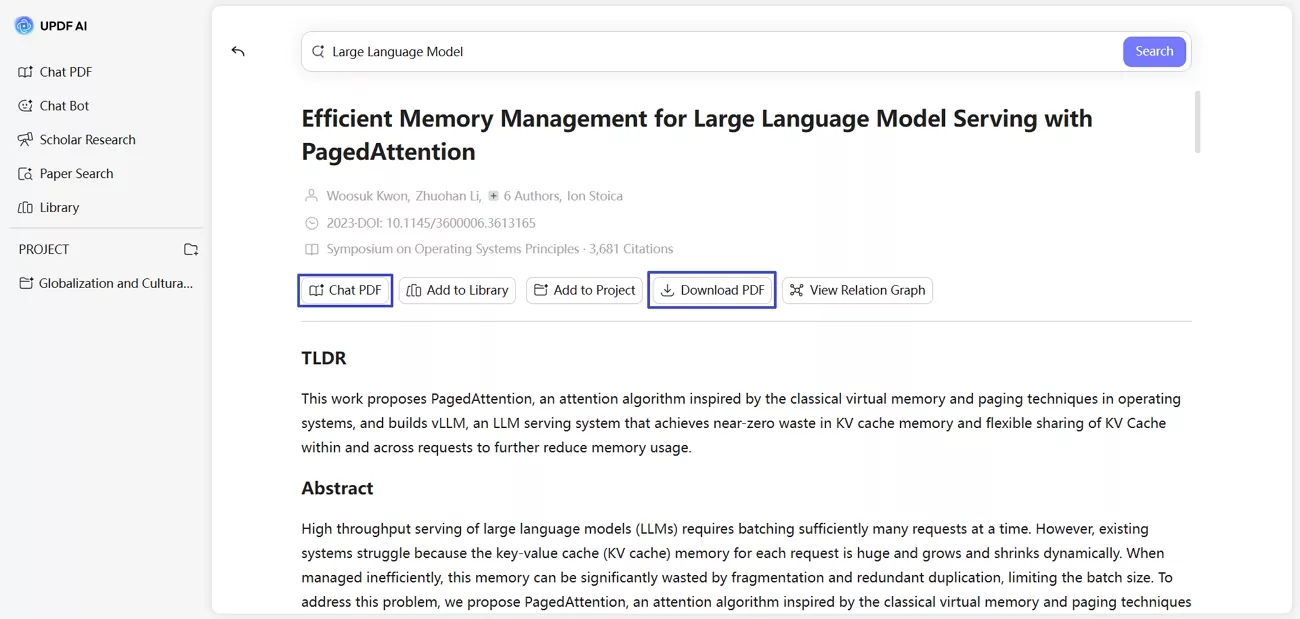
Other Useful Features
- Translate PDF: Instantly convert the text of any PDF into 12+ worldwide languages with a single click.
- Summarize PDF: Generate concise, easy-to-read summaries of complex PDF documents using advanced AI.
- Mind Map Generation: Create visual mind maps from PDF content to organize key ideas and relationships effectively.
- Convert PDF: Easily convert PDF files to other formats, such as Word, Excel, or PowerPoint, without losing layout or quality.
- Chat Bot: Interact directly with your PDF using the built-in chatbot to ask questions and retrieve specific information fast.
Part 3. Other Top AI Tools for Academic Research
For users asking, "what is the best AI tool for academic research?", here are some other tools that can assist you.
1. Perplexity
This tool delivers accurate research answers by sourcing information from an extensive database and returning concise summaries with citations. It specializes in providing detailed explanations and up-to-date findings for academic users in various fields.
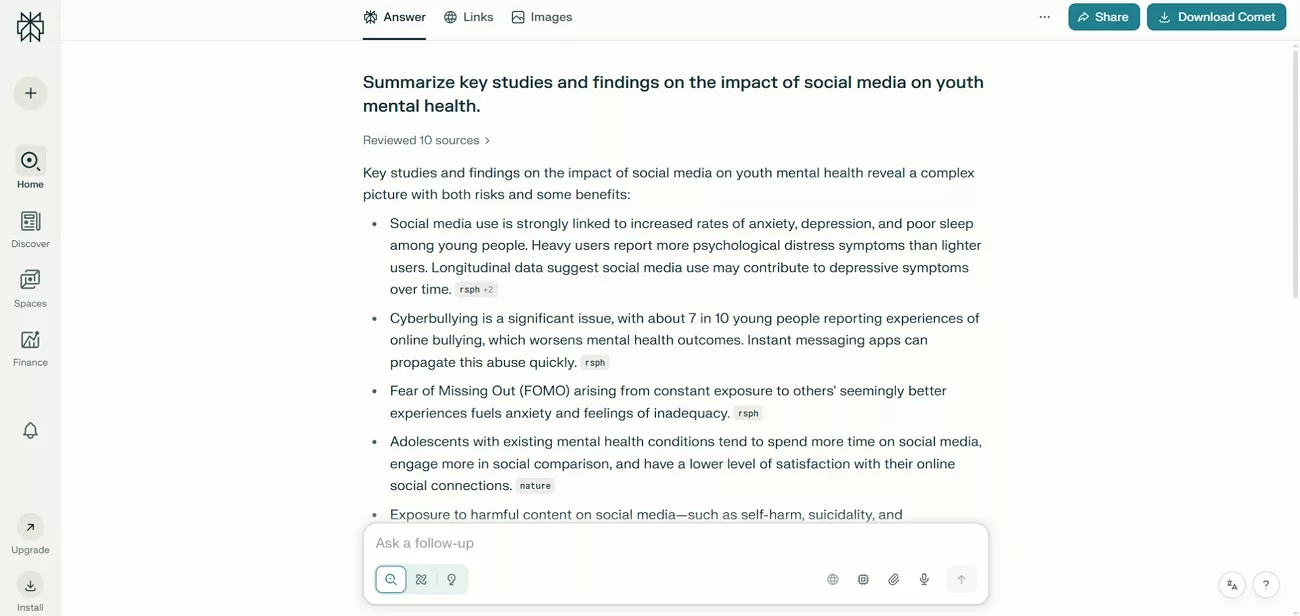
Pros:
- Retrieves supporting data from scientific journals and trusted literature repositories.
- References are included with every answer to ensure complete academic transparency.
Cons:
- Lacks integrated document highlighting or markup for reviewing retrieved research.
- Does not create relationship maps for exploring networks within academic literature.
Also Read: Perplexity vs ChatGPT >>
2. Scispace
This is a platform that is ranked among the best AI tools for academic research revolutionizes academic research by extracting supplementary data directly from scientific PDFs. Other than that, it is designed for researchers needing immediate data extraction and evidence analysis without switching tools or losing source accuracy.
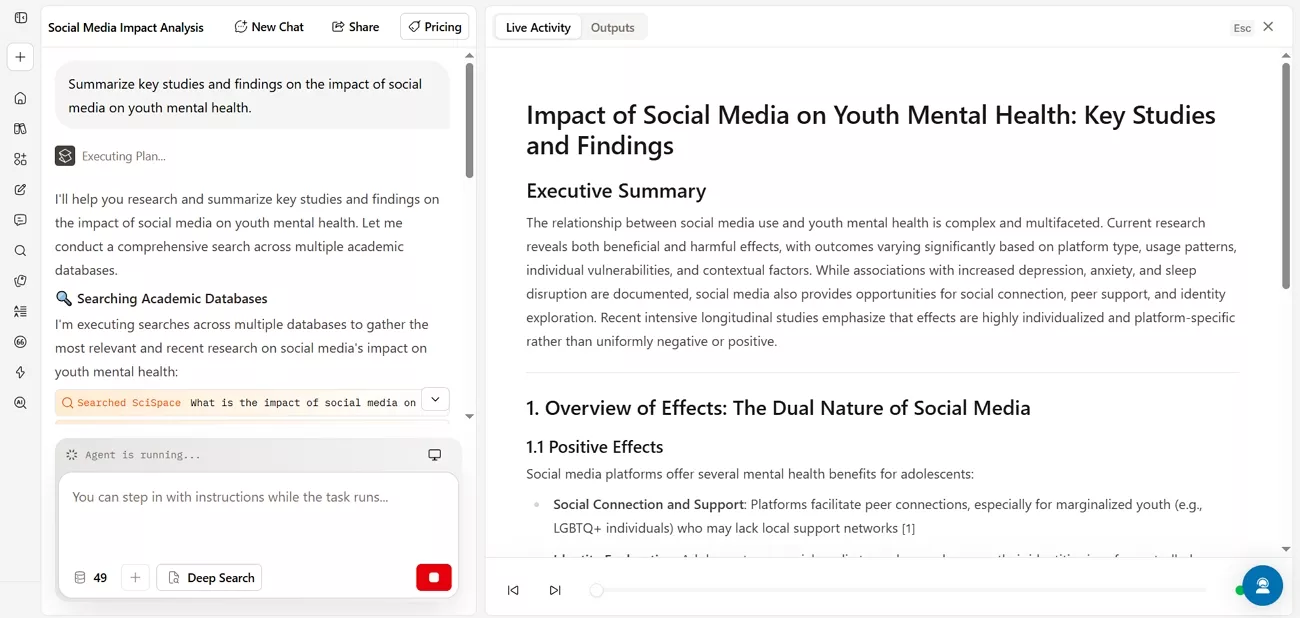
Pros:
- Directly imports key figures and tables from research articles automatically.
- Offers verified source links for every extracted data point during analysis.
Cons:
- Does not visualize research trends or citation networks across multiple studies.
- Lacks collaborative annotation capabilities for group project discussions or shared insights.
3. Elicit
Elicit is an advanced research tool that quickly collects information from multiple academic articles to provide accurate, structured, and reliable research data. It organizes extracted information into clear tables and detailed research reports for systematic reviews while allowing customization and easy analysis.
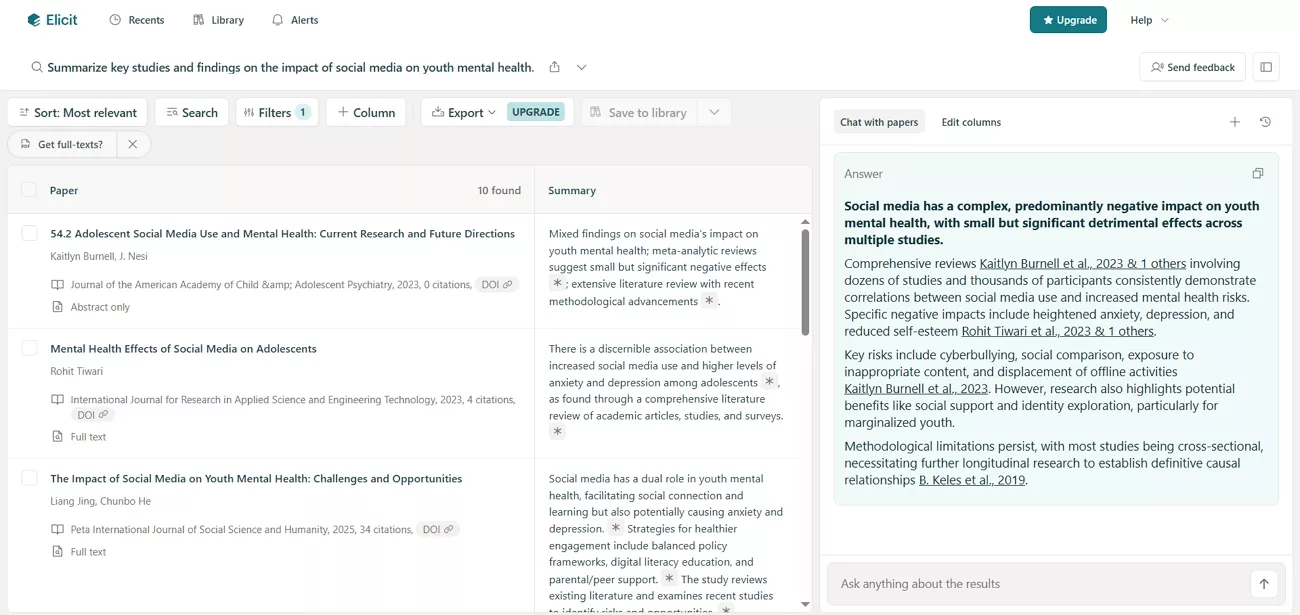
Pros:
- Can analyze up to twenty thousand data points at the same time.
- Offers sentence-level source citations for every table entry it produces.
Cons:
- Does not interpret non-text content such as research figures or images.
- Misses nuance in technical language when summarizing, especially complex documents.
Conclusion
In summary, AI is reshaping how students and researchers handle complex academic workloads. Choosing the best AI for academic research can help you eliminate repetitive tasks and speed up literature reviews of studies. After trying several tools, I found UPDF AI Online to be the most effective. If your workflows also involve academic research like mine, I recommend using UPDF AI Online to handle research tasks and save time.
 UPDF
UPDF
 UPDF for Windows
UPDF for Windows UPDF for Mac
UPDF for Mac UPDF for iPhone/iPad
UPDF for iPhone/iPad UPDF for Android
UPDF for Android UPDF AI Online
UPDF AI Online UPDF Sign
UPDF Sign Edit PDF
Edit PDF Annotate PDF
Annotate PDF Create PDF
Create PDF PDF Form
PDF Form Edit links
Edit links Convert PDF
Convert PDF OCR
OCR PDF to Word
PDF to Word PDF to Image
PDF to Image PDF to Excel
PDF to Excel Organize PDF
Organize PDF Merge PDF
Merge PDF Split PDF
Split PDF Crop PDF
Crop PDF Rotate PDF
Rotate PDF Protect PDF
Protect PDF Sign PDF
Sign PDF Redact PDF
Redact PDF Sanitize PDF
Sanitize PDF Remove Security
Remove Security Read PDF
Read PDF UPDF Cloud
UPDF Cloud Compress PDF
Compress PDF Print PDF
Print PDF Batch Process
Batch Process About UPDF AI
About UPDF AI UPDF AI Solutions
UPDF AI Solutions AI User Guide
AI User Guide FAQ about UPDF AI
FAQ about UPDF AI Summarize PDF
Summarize PDF Translate PDF
Translate PDF Chat with PDF
Chat with PDF Chat with AI
Chat with AI Chat with image
Chat with image PDF to Mind Map
PDF to Mind Map Explain PDF
Explain PDF Scholar Research
Scholar Research Paper Search
Paper Search AI Proofreader
AI Proofreader AI Writer
AI Writer AI Homework Helper
AI Homework Helper AI Quiz Generator
AI Quiz Generator AI Math Solver
AI Math Solver PDF to Word
PDF to Word PDF to Excel
PDF to Excel PDF to PowerPoint
PDF to PowerPoint User Guide
User Guide UPDF Tricks
UPDF Tricks FAQs
FAQs UPDF Reviews
UPDF Reviews Download Center
Download Center Blog
Blog Newsroom
Newsroom Tech Spec
Tech Spec Updates
Updates UPDF vs. Adobe Acrobat
UPDF vs. Adobe Acrobat UPDF vs. Foxit
UPDF vs. Foxit UPDF vs. PDF Expert
UPDF vs. PDF Expert



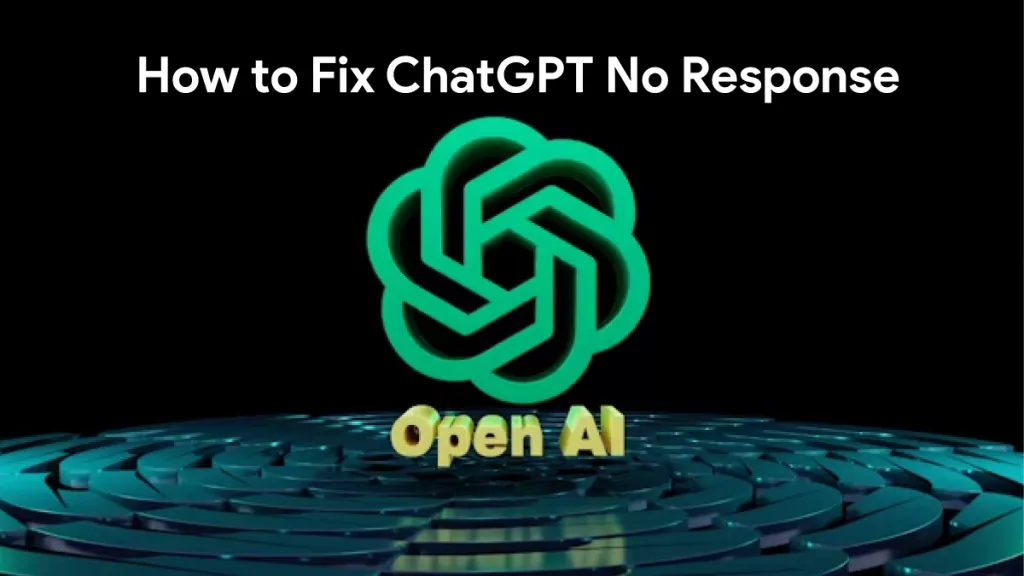


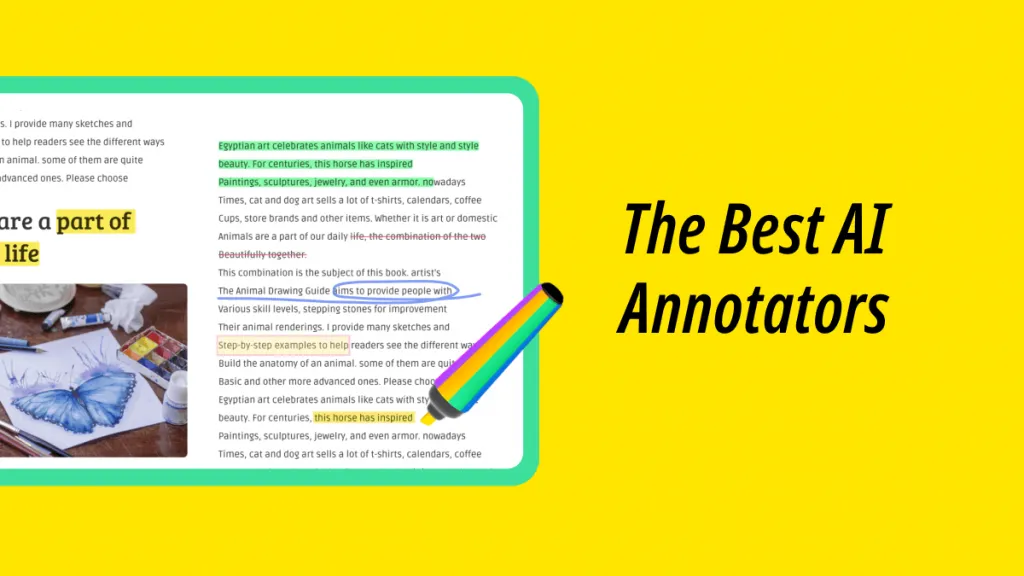


 Lizzy Lozano
Lizzy Lozano 
 Enrica Taylor
Enrica Taylor 
 Delia Meyer
Delia Meyer 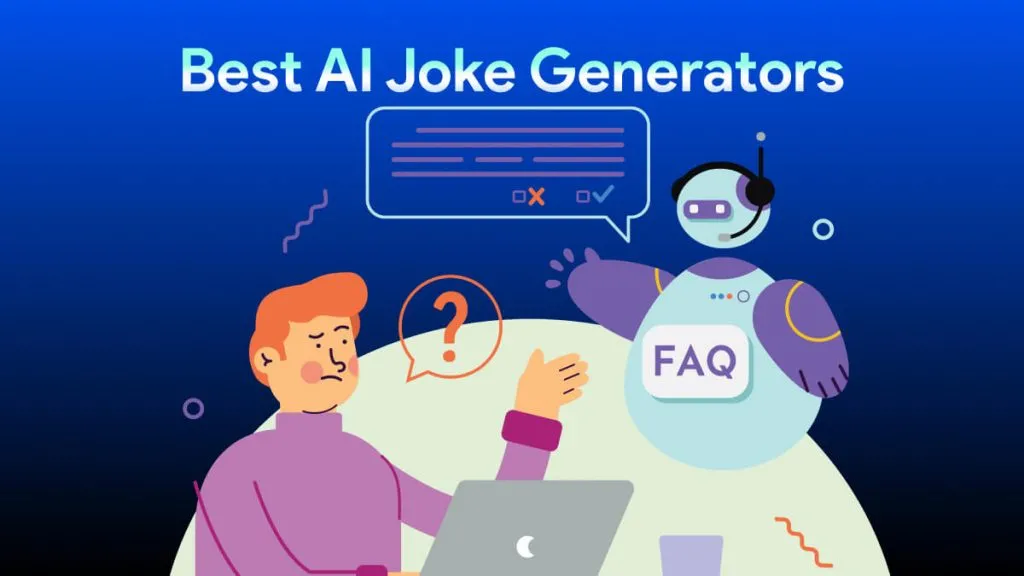
 Enola Miller
Enola Miller 
squestions10